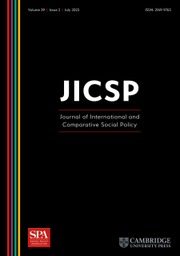Article contents
Do constitutions guarantee equal rights across socioeconomic status? A half century of change in the world's constitutions
Published online by Cambridge University Press: 09 March 2020
Abstract
For those disadvantaged by bias and barriers based on socioeconomic status (SES), constitutions can provide a defense against discrimination and a foundation for greater equality in social, economic, and political life. In light of the near-global commitment to a multi-dimensional poverty reduction agenda and the increased inclusion of marginalized groups in constitution-drafting processes, this article examines how 193 constitutions address SES and how this has changed over time. The majority of constitutions guarantee equal access to primary education across SES (59%) and prohibit discrimination on this basis (58%). Fewer guarantee access to healthcare (20%), equal rights in employment (15%), eligibility for legislative office (4%), and voting rights (4%) across SES. Constitutions adopted after 1990 are considerably more likely to protect equal rights across SES than older ones. However, 25% of constitutions – including 17% of those adopted since 1990 – restrict political participation based on socioeconomic characteristics.
Keywords
- Type
- Articles
- Information
- Journal of International and Comparative Social Policy , Volume 32 , Issue 3 , October 2016 , pp. 235 - 263
- Copyright
- Copyright © 2016 Informa UK Limited, trading as Taylor & Francis Group
References
- 3
- Cited by


